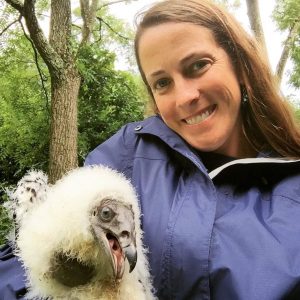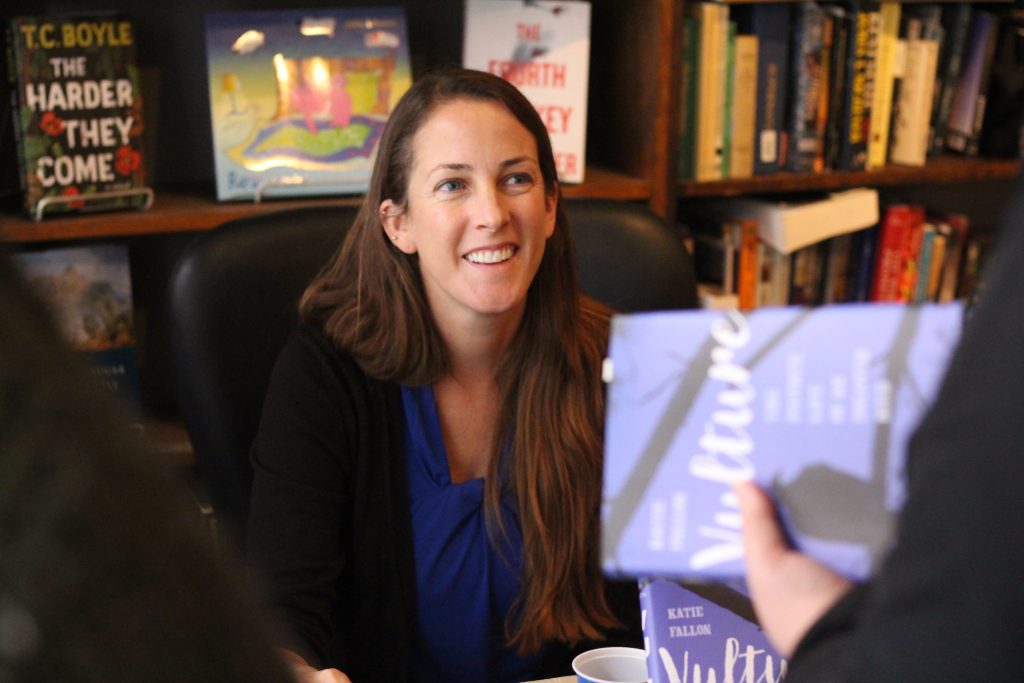 Katie would love to visit your group to give a presentation or a reading from one of her books. Each of the following presentations lasts 45 minutes to an hour. Katie’s interactive presentations utilize PowerPoint slides with photographs, videos, and information. Speaking fee or honorarium is negotiable, but Katie asks that travel and associated costs be covered by the hosting organization. Please contact her with questions or for more information.
Katie would love to visit your group to give a presentation or a reading from one of her books. Each of the following presentations lasts 45 minutes to an hour. Katie’s interactive presentations utilize PowerPoint slides with photographs, videos, and information. Speaking fee or honorarium is negotiable, but Katie asks that travel and associated costs be covered by the hosting organization. Please contact her with questions or for more information.
Presentations Available:
Vulture: The Private Life of an Unloved Bird. Vultures are often overlooked, underappreciated, and unloved, despite the vital roles they play in healthy ecosystems. Worldwide, vultures are primarily scavengers; they can help stop the spread of disease by quickly and efficiently removing dead animals from the landscape. Unfortunately, due to poisoning, direct persecution, habitat loss, and other threats, vultures are more likely to be threatened or endangered than any other group of raptors. But in the Western Hemisphere, Turkey and Black Vultures counter this trend and are increasing in number. Based on Katie Fallon’s recent book, this fun presentation will explore the life and times of the noble Turkey Vulture, including its feeding, nesting, and roosting habits, migratory behaviors, and common misconceptions. Katie will also discuss what it’s like to be up-close-and-personal with Turkey and Black Vultures through her work with the Avian Conservation Center of Appalachia.
Saving the Cerulean Warbler. The Cerulean Warbler is the fastest-declining Neotropical migrant songbird, losing 3% of its population per year since 1966. In addition to sharing tips for finding and identifying Cerulean Warblers while birding, this presentation will discuss the challenges these beautiful birds face during the breeding and non-breeding seasons. How do Cerulean Warblers attract mates? Who builds the nest, and how do they choose a nest location? How many young do they have, and how do they raise them? Once Cerulean Warblers leave North America at the end of the breeding season, where do they go? And what might they encounter along the way? Find out why your morning cup of coffee is important to Cerulean Warbler conservation, and learn ways that you can help save migratory songbirds.
The Cerulean Warbler: West Virginia’s Unofficial State Bird. More than 70% of the world’s Cerulean Warblers nest and raise their young in the hardwood forests of Central Appalachia, with 35% in West Virginia, more than any other state. Sadly, the Cerulean Warbler is the fastest-declining Neotropical migrant songbird, losing 3% of its population every year since 1966. In addition to sharing tips for finding and identifying Cerulean Warblers while birding, this presentation will discuss what makes West Virginia appealing for these and other migratory songbirds and what we can do to help them here. We will also discuss the threats and challenges Cerulean Warblers face in their migratory and winter ranges, and you will find out how something as simple as your morning cup of coffee can help conserve Cerulean Warblers, Wood Thrush, Scarlet Tanagers, and other birds that make West Virginia their summer home.
Shade-grown Coffee: Bird Conservation in Your Cup
Many bird species have been in decline for decades; according to the famous 2019 study published in Science, North America has lost almost 3 billion birds since 1970. For migratory species, loss of habitat range-wide is one of the greatest concerns. Deforestation in the tropics, often due to agriculture and development, removes and degrades habitat for Neotropical migrants—birds that breed in North American but overwinter in Central or South America. A simple consumer choice can help conserve habitat for these migratory species: purchase and drink shade-grown coffee. Shade-grown coffee farms can provide healthy winter homes for “our” songbirds, including warblers, thrushes, tanagers, and flycatchers. This presentation will introduce the basics of shade-grown coffee: what it is, why it’s important, and how you can help.
Short Bio:
Katie Fallon is the author of the nonfiction books Vulture: The Private Life of an Unloved Bird (2020, 2017) and Cerulean Blues: A Personal Search for a Vanishing Songbird (2011), as well as two books for children. She is the Executive Director of the Avian Conservation Center of Appalachia, a nonprofit organization dedicated to conserving the region’s wild birds through research, education, and rehabilitation. She has also served as President of the Mountaineer Chapter of the National Audubon Society. Katie is a Certified Professional Bird Trainer and has worked with birds since 1998; over the last twenty-five years she has given educational presentations featuring live raptors, vultures, parrots, and corvids. She writes the column WINGBEATS for Bird Watcher’s Digest and has taught writing at West Virginia University, Virginia Tech, and elsewhere. In 2022 Katie tried something new; she ran for a seat in the West Virginia state legislature and lost by just 138 votes! Her first word was “bird.” For more: www.katiefallon.com.
